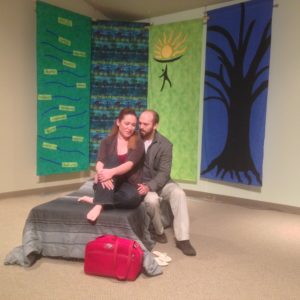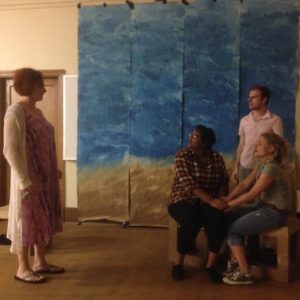
Horizon Youth Theatre and the Black Swamp Players joined forces for “Seussical” at the First United Methodist Church.
Horizon Youth Theatre is a troupe on the move… by necessity.
The troupe is now in its 19th year of giving local children and teens the chance to be drama kings and queens, and it continues to be nomadic – at Otsego Elementary for its Festival of Shorts April 8, 9 and 10; holding drama classes at St. Mark’s in Bowling Green also that month; and in June presenting “Honk!” at the First United Methodist Church in Bowling Green. The location for the summer workshops is still a question mark.
The troupe has had many homes over its lifetime from the soon-to-be-demolished theaters in University Hall on campus to whatever space has been available at the Woodland Mall.
In a recent conversation a group of board members – President Karen Walters, Elizabeth Roberts-Zibbel, Alisa Suelzer and Haley Wilkins – said despite that peripatetic existence the troupe continues to provide theater experience to dozens of children. Since children participate in different ways, drama club to the full-blown productions, putting a precise number on how many children it serves is difficult. And the troupe is always recruiting. Still Walters estimated the participation has doubled in the last three years.
“Our goal is education first, and we do that by putting on very high quality productions. But we’re not so much performance oriented as educational,” she said.
Still the troupe knows how to put on a show as demonstrated by its participation in the Ohio Community Theater Association’s OCTA Fest Jr. and its collaborations with its partner the Black Swamp Players, including the recent production of “Seussical.”
To do this, the board members said, they’ve had a lot of help from various segments of the community. They depend on the kindness of strangers. They appreciate that help.
The mall management, Walters said, has gone out of their way to let Horizon use space rent free even doing set up for them. But recent changes there has meant there’s no room in the mall. At least for now.

Black Swamp Players presented the fall one acts in three different venues including the Veterans Building in City Park.

Lionface Productions performed “Who We Were When We Were Animal”at the Maumee Valley Unitarian Universalist Congregation.
The Otsego school district stepped up when a previous arrangement with the Bowling Green school district fell through. “They bent over backwards” to make Horizon feel welcome, Walters said. They even allowed the troupe to stage two productions last fall, one of 6-12 year old and another for teenagers, even though the production schedules for the two overlapped. Though that may have taken a toll on parents with kids in both shows, it worked out well.
“We’ve always been homeless, technically. Being nomadic and non-profit is naturally challenging,” Walters said.
“This year has been especially challenging,” Suelzer said.
An arrangement with Bowling Green State University several years ago looked like it would ease the troupe’s search for space. But even with a brand new Wolfe Center for the Arts, finding time when they could fit in proved difficult. After presenting a couple summer musicals in the Donnell, and a show in the choral rehearsal hall, Horizon was back looking for space. Walters also noted that the Donnell is not set up for individual performers to be mic’d, a necessity with young actors.
When they learned the use would be even more restricted, Walters said, the board decided not to even ask.
The troupe also has used the Performing Arts Center at the Bowling Green Middle School, but the cost and availability proved problematic. When they asked what the cost would be to stage the summer musical, they were presented with an estimate that was more than twice what they had been paying. What they had been paying was already a strain on their budget.
Ryan Albrecht, the building manager and technical director of the PAC, said that the costs are determined by a policy set by the Board of Education when the facility first opened. That policy, he said, has been more strictly adhered to since Superintendent Francis Scruci took over.
Making deals is “beyond my pay grade,” Albrecht said. “Somebody’s got to foot the bill.”
Horizon is cost sensitive. All the youngsters pay a fee for participating, but that needs to remain “reasonable” so the families are not priced out of the experience. Same goes for ticket prices. “We don’t want the ticket prices ever to be so high that families feel they can’t bring their children to see live theater,” Walters said.
Horizon runs a bare bones budgets. “It’s amazing what we can come up with out of almost nothing,” said Wilkins.
Albrecht is sympathetic to the troupe’s plight. His wife, Brittany, works with Horizon. They have been involved as well with Beautiful Kids Independent Shakespeare Company which stages Shakespeare in City Park. He’s on the board of Lionface Productions, an independent theater company made up of young adults. Like Horizon, they are always moving about trying to find places to rehearse and perform.
Lionface performed in churches and former churches. Lionface made the most of the sanctuary at Trinity United Methodist for its productions of “Murder in the Cathedral” and “Doctor Faustus.”
Most recently it staged plays in the Maumee Valley Unitarian Universalist Congregation on Ohio 25. The church was very welcoming, he said, and unlike other churches did not ask to review scripts. That’s important since the company focuses on performing edgy original work and Shakespeare, which has its share of sex and violence. “They were fantastic,” Albrecht said. “But it was too far out of town. We weren’t attracting the same crowds. Our ticket sales saw the results of that.”
For several seasons, the troupe used a former church in the 100 block of East Court Street. Again, Albrecht said, the landlord Floyd Craft, was very accommodating, but now the space “is actually a business.”
BGSU’s renovating of its core of original buildings has also eliminated rehearsal space for companies. Both Lionface and Broken Spectacle productions used the empty classrooms in Moseley and University halls for rehearsals.

Broken Spectacle rehearses “Swimming in the Shallows” in Moseley Hall on campus.
Broken Spectacle, founded by BGSU theater professors Jonathan and Sara Lipinski Chambers, has as part of its mission “working in a variety of spaces, including ones that are not typically thought of as suitable for theatre,” Jonathan Chambers wrote in an email.
But usually these spaces, Grumpy Dave’s or the now closed Café Havana, can’t provide space for the troupe to rehearse for two months. Broken Spectacle has used the space on campus though Chambers asserted “we are opposed to squatting in spaces … without going through the process of reserving them and, if necessary, compensating those who own them.”
And, as Horizon knows: “The Wolfe Center is pretty much fully booked, so getting space in there is really not an option.”
Chambers also wrote: “The lack of rehearsal space definitely is a determining factor when talking about projects. We have hopes of taking on bigger projects that would require our ability to be in a space for an extended period, but without access to spaces suitable for us to rehearse those works they will need to stay on the backburner for the time being.”
Bowling Green has a strong theatrical culture, Albrecht said. But “people don’t realize the time and money it takes.” Money to “turn on the lights, pay the custodian.”
Founded in 1968, the Black Swamp Players as the elder troupe in the city are old hands at dealing with space issues. They moved from venue to venue in their early years.
The Players did perform at the mall during the 1990s, but when that space was rented out, it settled into a comfortable arrangement with the First United Methodist Church.
Melissa Kidder, president of the Players’ board, said in a recent email: “BSP has been eternally grateful to First United Methodist Church for providing us a space to house our productions over the last several years. We know that it is not always easy for an institution to coordinate and allow outside groups in one’s space, especially when they have their own events and members to consider. But FUMC has always been accommodating and understanding to our organization and we are happy to be working with them and using their incredible facility.”
This fall when the church was using the space for its own dinner theater the Players took their show, a production of one-act plays, on the road performing in three different venues – the Cla-zel, the Veterans Building in City Park and the Simpson Building (another recycled church by the way). Kidder credited Deb Shaffer with the idea.
“One of the very reasons we decided to go on the road this last Fall,” Kidder wrote, “was because we wanted to spread the word about BSP to the community and we thought by physically getting out into the community and performing in places like the Cla-zel and the parks buildings we could spread the word and our mission.”
She said they were pleased with the results.
Still, Walters, who represents Horizon on the Players’ board, said “they have the same conversations we do. They look at the same spaces. … I just so think this town could support a free-standing facility for live theater.”
Kidder concurs. “Having one’s own space certainly allows you to focus solely on the mission of your organization and directly reach out to the community instead of worrying about location for every rehearsal, performance.”
“All of our organizations want to provide the Bowling Green community and our volunteers with different types of performance art. It is a passion that we all share in common. How wonderful would it be, not just for us theatre organizations, but for the entire Bowling Green community, if there was a separate facility specifically devoted to local performance art groups!
“Overall, I just have to say that having a separate space specifically devoted to local performance art groups would be the perfect solution not just for HYT, but for BSP, Lionface, Broken Spectacle Productions, and for any other performance art organization in Bowling Green and it would offer the Bowling Green community the best avenue for supporting local community theatre.”
